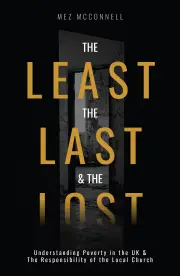This book is the product of over 20 years of thought and thousands of hours of research. This book is for any and every Christian who has an interest in the poor and the oppressed.
At heart, this is a book about how to love God better by loving the least, the last and the lost.
In The Least, the Last & the Lost, Mez McConnell speaks into poverty, class and culture in the UK and calls the church to rethink what effective evangelism and discipleship looks like in the UK's most deprived communities. Based on rigorous statistical research and hard-earned experience, this book is an invaluable resource for anyone who seeks to understand the issues facing least, the last and the lost in our country and beyond.
----
“In The Least, The Last & The Lost, McConnell shares his razor-sharp analysis of the struggles of those living in poverty and how it has impacted the development of the church in modern Britain. More than just theological, this book charts the history of the church in the UK today. More than just sociological, this book points to a hope that is transcendent. More than just recounting grievances, this book sets out a vision for the spiritual renewal for those living in hard places. I truly believe that were church leaders to take time considering the conclusions of this book, then the result will be many more healthy churches in our poorest communities.”
Dr. Matthew Spandler-Davison, Director of Acts 29; author of Church in Hard Places; Executive Director of 20schemes
“It is easy to say that we share the ambition of Paul to preach the gospel where Christ is not known. It is far harder to action that ambition when we discover that many of the places where Christ is not known are the poorest communities in the UK. The contributors to this insightful book share the conviction that our Lord Jesus reaches people in communities of all kinds (including those in the poorest areas) through healthy gospel churches. Prepare to be informed and educated; prepare to be reminded of the saving power and wisdom of Christ; prepare to be made to think differently; prepare to be challenged and rebuked; prepare to be driven to prayer and action. This is not a comfortable book to read, but it is a book that needs to be read. It reflects the heart of our Lord Jesus for those often neglected by others. Spurgeon once said, ‘The joy of Jesus is the joy of saving sinners.’ This book calls us to believe that His joy is saving people who live in every kind of community, including the poorest.”
Jonathan Prime, Associate National Director of FIEC (Local Ministries)
“Warning: this book may change you; it’s a powerful, thorough, much needed challenge to evangelical church in the UK. It’s easy to read but hard to swallow. With moving testimony and stark research, it helps highlight the disparity and challenges faced in reaching the least, the last and the lost in our society. The schemes, valleys and council estates of our nation need Jesus; they need healthy churches; and they need you to support those churches.”
Will Savory, Pastor of Soul Church, Neath
-
Title
The Least, the Last & the Lost
-
Author(s)
-
ISBN
9781783973286
-
Format
Paperback
-
Publisher
-
Topic
Church, Life's Challenges
-
Audience
Adults, Church Leaders
-
Published
01/11/2021






